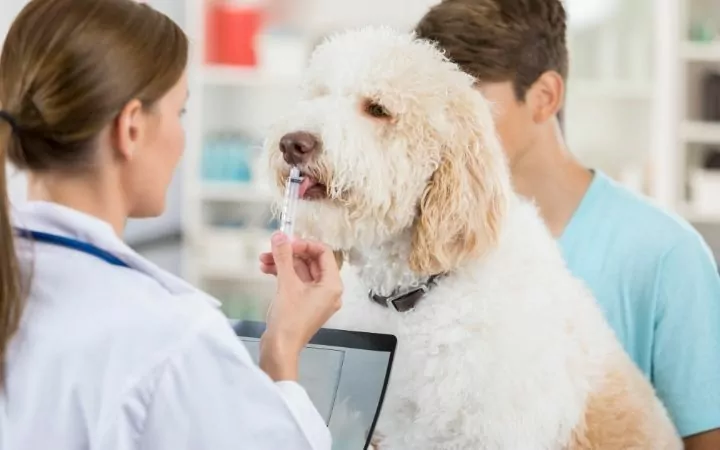Your dog is licking and scratching, and you’re not sure why. Is it that new candle you just lit? New detergent? Perhaps it’s the new food that you switched them onto, or maybe it’s because you turned on the heat.
Whatever the case, your dog is bothered. If this is the first time it has happened to your dog then make sure to consult with a veterinarian. If this has happened before and you’re aware of your dog’s allergies it can be frustrating since they are so general. Knowing what they are allergic to can be a long, drawn-out process.
But it doesn’t have to be! It can also sit well with you that there are options as far as medications go. What’s even better is that many of these medications are over the counter, which is both convenient and comforting. After you consult with your veterinarian on the frequency and dosage you may be able to find your pet some relief. Read below for some more info on this!

Is Over-the-Counter Allergy Medicine Safe for dogs?
We often get the question, is this medication safe for my dog? The answer is pretty straightforward but has a lot of components to it. Yes, there are some medications that humans take that are safe for dogs.
Yes, some medications are definitely not safe for dogs. The power is in the knowledge of knowing which. Often, these medications that are deemed safe for dogs can become unsafe with incorrect dosing.
Therefore, it is always best to consult with your veterinarian on the amount and type of drug given. Remember to provide all the information regarding the medication so that your dog can be best-taken care of.
Common OTC Medicine for Canine Allergies
Below is a list of common allergy medicines and what they do for your pupper. Remember to always consult with your veterinarian before giving any medication that you can get over the counter.
Antihistamines – perhaps the most common and well-known allergy medication is the antihistamine. Let’s discuss what histamine is to fully understand what this medication does.
Histamines are chemicals that your immune system makes to tame allergens. Let’s say a sneeze, runny nose, etc.; those are both ways your body is trying to rid of the allergen that is invading it.

When allergens enter your body, your immune system responds to them as if they are foreign invaders that are harmful to you. Then the mast cells in your dog’s body release histamines to boost blood to the areas of concern. This blood flow causes inflammation, which then causes your dog’s body to repair the surrounding area. Because histamines are also in your gut, they also respond to food allergies. Some common antihistamines are:
All of these medications are deemed safe as long as there are no other additives, so make sure you read the label carefully and consult with your veterinarian before use. It is also good to note that some of these medications can make your pet drowsy (because they block histamine) or hyperactive.
Decongestants – obviously, a decongestant’s main job is to clear the blocking that is causing our dog’s breathing issues. They are often offered in nasal sprays however, it is best to consult with your veterinarian on the safety of giving a nasal spray to your dog. Some common decongestant sprays are:
- Flonase (fluticasone, which is a steroid)
- Nasonex (contains steroid, and antihistamine)

Sprays, gels, ointments – For many environmental allergies, the harm lies in how the dog licks, bites, and scratches at the area of concern. This can often result in a secondary infection or inflammation at the very least.
You can safely give many OTC topical medications to your dog in these times. However, it is essential to note the ingredients in the medicines for any contraindicating reactions. For instance, steroids will often delay healing by weakening your immune system. This can result in a fungal or bacterial overgrowth.
This is likely to happen if your dog has already self-mutilated itself and left the area open for opportunistic funguses and bacteria. If used before that, it can help relieve the itchiness and lessen the inflammation that is taking place.
Artificial tears – our dog’s eyes need to be kept lubricated to stay healthy. When dust or debris gets in them, it can cause itchiness, pain, and irritation. This can often lead to your dog rubbing or scratching their eye, resulting in further trauma.
Using a product such as artificial tears can relieve the dryness caused by environmental allergies or perhaps just remove the irritating foreign body. It’s important to note that eyes are always an emergent issue. Issues with the eyes can go South relatively quick, and it is of utmost importance you keep your veterinarian in the loop as soon as an issue with the eyes pops up.

Antibiotic ointment – When your dog self mutilates, as stated above, it is vital to treat the secondary infection or issue at hand. Antibiotic creams can be helpful to heal and treat wounds. They do not replace systemic antibiotics if needed; however, they only aid in the topical aspect. Make sure to read the labels carefully and to go over every ingredient with your veterinarian.
- Neosporin (neomycin/ polymyxin/ bacitracin)- is a common antibiotic ointment used in first aid kits that is safe for your dog. It is used to treat minor burns, scratches, or wounds to prevent infection from occurring. Using this ointment after cleaning the wound is safe and effective. However, if the injury progresses, it is best to see your veterinarian as your dog might need a systemic antibiotic.
The Clinical Signs of Dog Allergies
Clinical signs of allergies can mimic other diseases, so it’s best to see your veterinarian before deciding what is causing the issues. Some clinical signs of allergies are:
- Anaphylaxis – this is always an emergency and can show up through facial swelling, closing of the throat, seizure, hives
- Itchiness
- Red skin
- Diarrhea
- Vomiting
- Licking
- Chronic ear infections/rubbing face and ears
- Itchy eyes
Predisposed Canine Breeds
Like with all other diseases, certain breeds are prone to allergies. They are:
- Bulldogs
- Labrador Retrievers
- West Highland White Terriers
- Boxers
- Sharpeis
- Wired hair terriers
- Golden Retrievers
- Maltese
- Shih Tzu
- Boston Terriers
These breeds may be predisposed. However, allergies can affect any breed of dog.

The Benefits of Allergy Vaccinations for Dog Allergies
What are allergy vaccinations, you may ask? Well, first, a blood sample is taken from your dog, or an intradermal injection can be given. The intradermal injections consist of giving your dog the allergen and using a control injection to see where flare-ups occur.
Going from those statistics, your dog will get custom shots made that are small bits of the most reactive allergens. There are many benefits to giving your dog allergy injections. For one, they can provide your dog relief over time; they also can cause immunity to the allergen that is delivering your dog problems. It may be difficult, however, for owners to give their dogs shots if they are squeamish.
But, if they are up to the task, a demonstration can be given and, with practice, can be done safely and efficiently. There are some downsides to allergy injections as well. They tend to take a long time to be effective and usually must be given for life.
Suppose you look at giving medication though some of those are for life as well and can have other side effects that can cause harm later in life. So really, it’s just about weighing your options and doing your cost risk analysis.
At-Home Treatments to Try for Pet Owners
The beauty of OTC medication is that they are technically at-home treatments. You can safely use these medications (as long as you review the dose and ingredients with your veterinarian) without making the trip to the vet.
Of course, if things progress or do not get better, then it is best to take your dog to the veterinarian to be looked at in person. You can try Epsom salts or eliminating anything new or dust provoking for environmental allergies.

Using simple ingredient cleaning products and detergents can also help. Doing a food trial is another way to limit what might be giving your dog food allergies. Remember, with a food trial, it is essential to be very strict. You have to adhere closely to giving your dog the right foods.
If you throw an unexpected treat in, then the whole trial is thrown off and needs to be restarted. There are many novel diets out there that dogs seem to have less trouble with, with lower reactions. Some novel diets include kangaroo, venison, rabbit, duck, and even ostrich.
These meats have less fat and cause fewer reactions vs. chicken, beef, turkey, or lamb. As stated before, it is essential to only give that food and that food only. You can also try giving your dog Epsom salt soaks to relieve any inflammation.
Cleaning their paws and skin folds regularly to remove any environmental allergen is another way to help avoid itchiness and secondary issues. Sometimes a combination is your best bet, and when all else fails, systemic or topical medication issued by your veterinarian will do the trick. It is also important to give your dog a monthly preventative to prevent fleas and flea allergy dermatitis.
Things to do Before Purchasing an OTC for Your Dog
First and foremost, consult with your veterinarian on the medication type, the active ingredients, and what dose and frequency to give. Another reason that you should speak to your veterinarian before giving any medication is your dog’s history.

Some drugs cannot be given with others, and your veterinarian will be able to look through your dog’s file and advise. Another thing you can do is give your veterinarian and yourself all the information. Make a list of any new diet, environmental stimulus, and what your dog is experiencing. This can help narrow down towards the allergen that is wreaking havoc in your dog’s body.
Summary
Allergies are ruff (see what I did there?) and can be extremely challenging for both owner and veterinarian. Not to mention your dog, who is the one suffering. With time, patience, and a proper history, you can help combat them. Using medication, injections, and limiting allergens is a fresh and sure way to keep them at bay.
